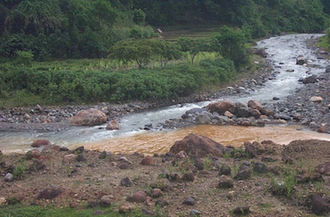Philippines: Churches protest as government lifts mining ban

Caustic mining waste pours into Mamkayan Creek image: Columbans
Ahead of Earth Day, Caritas Philippines, together with several bishops and their dioceses have expressed their concern at President Rodrigo Duterte's decision to lift a nine-year moratorium on new mining deals. They warn that the move could have a catastrophic effect on poor and marginalized communities.
Duterte signed an Executive Order on 14 April, lifting a nine-year moratorium on new mining deals imposed in 2012 by former President Benigno Aquino III, who called on government authorities to check and renegotiate contracts with mining firms in cases of environmental abuse. Aquino's moratorium also provided a respite to the environment to regenerate its depleting flora and fauna.
The moratorium had been imposed while the government worked on legislation to boost the state's share of mining revenues. Since 2018, the excise tax on minerals has doubled to 4%. The Philippines became the top supplier of nickel ore to China and a major producer of copper and gold after Indonesia banned exports of unprocessed ore.
Duterte's spokesman Harry Roque explained that the nation said is expecting about US$4 billion in capital investments from three major mining projects. They are expected to generate $800 million in local taxes and $400 million worth of social development projects. He told the Business World newspaper that indigenous groups are also expected to benefit with around $310,000 in royalties from the major mining projects.
Bishop Jose Collin Bagaforo of Kidapawan, national director of Caritas Philippines, denounced Duterte's move saying: "The decision will only favour business interests, not the people, especially the poor and marginalized communities." "The government has once again chose vested interests and profit over suffering people and the ecology," he said in a statement at the weekend. "The government must reconsider lifting the mining moratorium. We are in the countryside, and we are seeing no economic improvement in the lives of the people from mining," he said.
Mining is a highly contentious issue in the Philippines after past cases of environmental mismanagement fuelled a strong lobby against the industry led by local governments, legislators, advocacy groups, anti-mining activists and the Catholic church.
The Philippine Catholic Church and numerous civil society groups have entered into a partnership dubbed Eco-Convergence to promote the teachings of Pope Francis' encyclical Laudato si' on the care of 'our common home', the earth. Several Philippine bishops have reiterated the position of Caritas Philippines.
Archbishop Ricardo Baccay of Tuguegarao, who leads the Caritas' Eco-Convergence Hub in Luzon, said that the off-shore mining in Cagayan province, which was devastated by massive flooding in 2020, is likely to bring more harm than good once it will be fully operational. "The magnetite mining," he said, "is projected to exacerbate flooding, and cause massive erosion in coastal and near shore areas, which might again cause the loss of lives." he said.
Bishop Gerardo Alminaza of San Carlos, who leads of Eco-Convergence Hub in the Visayas, reiterated their stance against the proposed coal mining in Negros Occidental province. "We challenge our government officials, to restore the dignity of your office by siding with our people and the ecology. Let your legacy be in the defense of ecology and justice," he said.
According to Bishop Allan Casicas of Marbel who heads Eco-Convergence Hub down south, while the Tampakan mines in South Cotabato might garner billions of dollars in export earnings along with two other mining operations in Mindanao, it will also exponentially destroy the Mindanao River Basin and severely affect nine provinces with more than 3.5 million population.
"The Catholic Church, through Caritas Philippines, the Eco-Convergence and the CBCP National Laudato si' Program strongly enjoin President Duterte to reconsider the lifting of the mining moratorium," Bishop Bagaforo said.
"The Catholic Church, through Caritas Philippines, the Eco-Convergence and the CBCP National Laudato si' Programme," Bishop Bagaforo said, "strongly urge President Duterte to reconsider the lifting of the mining moratorium."
He said the government's decision, which "is a sign of desperation to solve the enormous economic gap caused by the Covid-19 pandemic," is unsustainable, destructive and extremely detrimental to the Filipino communities in the peripheries, and the Philippine ecology. He pointed to the provinces of Marinduque and Albay provinces, saying the mining companies have left but "the ill-effects to the local ecosystems still threaten communities who gained nothing from the operations".
Ahead of Earth Day, April 22, dioceses in coal-affected provinces of Quezon and Negros urged Philippines banks to withdraw their financial support to the coal industry by simultaneously displaying banners calling on them to 'Restore our Earth', which is the theme of this year's Earth Day.


















